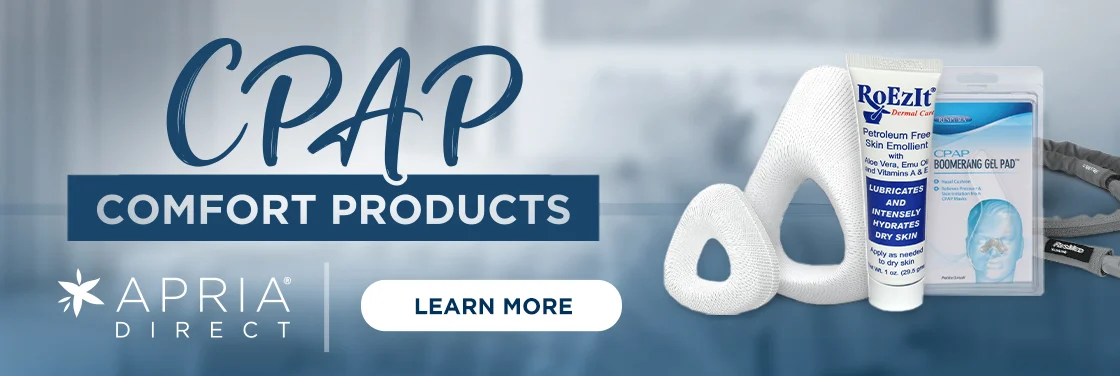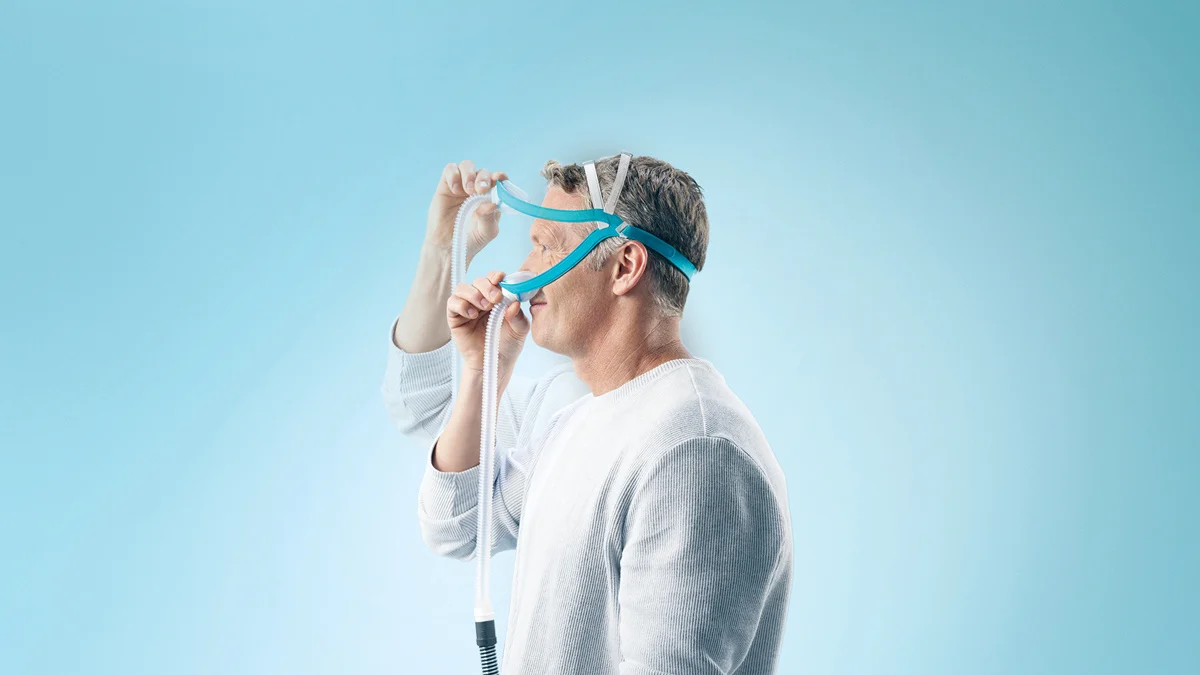It’s a Common Problem. But Here Are Tips and Tricks to Help You Avoid It!
CPAP (continuous positive airway pressure) is a popular, proven treatment for sleep apnea. That’s because it effectively keeps your airways open so you can breathe more easily and sleep more soundly throughout the night.
Yet like most therapies, there may be side effects. One of the most common is skin irritation.
Some people who use CPAP complain of red marks, sores, acne, and rashes, which can be painful. People with sensitive skin are even more prone to these conditions.
Although most of these problems are cosmetic, if they aren’t resolved, they can become serious. And they may even cause you to stop your CPAP therapy. You don’t want to do that. Untreated sleep apnea can lead to other serious health conditions, including diabetes, stroke, depression, and obesity.
Robert Miller, Apria Healthcare Vice President of Sleep Business, says, “Understanding the causes of skin irritation and ways to resolve any problems you may be having is important. It can help you continue to get the benefits of your CPAP therapy.”
1. Choose the Right CPAP Mask
Most skin irritation problems stem from the CPAP mask. And that makes sense, considering it sits on your face as you sleep. Even the slightest rubbing and movement throughout the night will irritate your skin.
That’s why it’s important to work with your doctor to select the right mask for you. There are five types:
- Full-face masks
- Nasal masks
- Nasal pillow masks
- Oral masks
- Under-the-nose masks
Today, there are sleeker CPAP masks with fewer contact points and less plastic exposed to your face.
2. Make Sure Your Mask Fits Properly
You should also work with your doctor to make sure your mask is the right size: not too big, not too small, just properly sized to fit your face.
If your mask fits properly, it will sit comfortably on your face. If it’s too loose, it will rub against your skin and cause chafing. If it’s too tight, it will dig into your skin, leaving marks and causing discomfort.
The secret is to adjust your mask with just enough tension that it creates a firm yet comfortable seal over your face, which helps prevent air leaks.
3. Keep Your Face and Mask Clean
If your skin is oily, it may cause your CPAP mask cushion to move around on your face, irritating it. The solution is simple: wash your face before bed every night.
You should also clean your CPAP mask—including the cushion, headgear, and frame—with warm water and mild soap every day. This helps prevent the buildup of bacteria, mold, dust, and germs, which may cause skin irritation as well as pneumonia or sinus infections.
Learn more about the dos and don’ts of CPAP cleaning.
4. Replace Your CPAP Mask
Even the best-maintained mask will eventually wear out. But when? If your mask exhibits any of the following, it’s probably time to replace it:
- Dryness and stiffness
- Cracking and tearing
- Yellowing or other discoloration
- A worn-out cushion
- Excessive leaking
5. Regularly Clean Your CPAP Machine
As with your CPAP mask, you should clean your CPAP machine regularly.
Most manufacturers and sleep experts recommend cleaning your CPAP filter, tubing, and humidifier weekly. But avoid devices claiming to clean CPAP machines using ozone or UV light; these haven’t been approved by the FDA.
Learn more about the dos and don’ts of CPAP cleaning.
You should also replace CPAP supplies regularly. Apria’s online ordering and Supplies on Schedule program ensures you get the right supplies at the right time!
6. Address Any Allergies to Silicone
Many mask cushions are made from silicone. And although silicone is safe and well-tolerated by most people, some people are allergic to it. You may be one. Check with your doctor about masks made from skin-friendly materials, such as soft, breathable memory foam.
Also, ask about mask liners, which provide an extra layer between your face and mask and help reduce red marks and inflammation caused by silicone allergies.
7. Try Creams and Moisturizers
Barrier creams and petroleum-free moisturizers can help relieve skin irritation caused by your CPAP mask. Just remember to wash them off before putting on your mask each night.
8. Stay With It
It may take you a while to adjust to your CPAP therapy. But be patient and stay positive. Over time, your skin will adjust to wearing the mask nightly. So you’ll sleep better each night—and feel better every day!
Apria’s Robert Miller adds, “Of course, if you continue to have skin irritation issues, be sure to speak with your doctor, who will make any necessary adjustments to your CPAP therapy.”
References
1. Summer, J. (Updated 2023, July 5). Common Side Effects of CPAP. Sleep Foundation. https://www.sleepfoundation.org/cpap/cpap-side-effects.
2. MedEQUIP Respiratory Technicians. (Updated 2016, August). PAP Mask Irritations. University of Michigan Health System. https://www.med.umich.edu/1libr/Homecare/MedEQUIP/PAPMaskIrritations.pdf.
3. Peters, B. (Updated 2022, June 15). How Silent Night CPAP Mask Liners Can Help Relieve Skin Irritation. Verywell Health. https://www.verywellhealth.com/silent-night-cpap-mask-liners-relieve-leak-skin-irritation-3946096.
4. 5 ways to reduce CPAP mask irritation. ResMed. https://www.resmed.com.au/blog/5-ways-to-reduce-cpap-mask-irritation.
5. (2022, July 9). Why Is My CPAP Mask Irritating My Skin?
Well Aware Systems. https://wellawaresystems.com/cpap-mask-irritating-skin/.
LEGAL DISCLAIMER: Material in this newsletter is provided for general health education and informational purposes and to provide references to other resources only; it may not apply to you as an individual. While Apria Healthcare believes that the information provided through this communication is accurate and reliable, Apria Healthcare cannot and does not make any such guarantee. It is not intended to be a replacement for professional medical advice, evaluation, diagnosis, services or treatment (collectively, “medical treatment”). Please see your healthcare provider for medical treatment related to you and your specific health condition(s). Never disregard medical advice or delay seeking medical care because of something you have read on or accessed through this website. Reading this newsletter should not be construed to mean that you have a healthcare provider/patient relationship.


.png)



